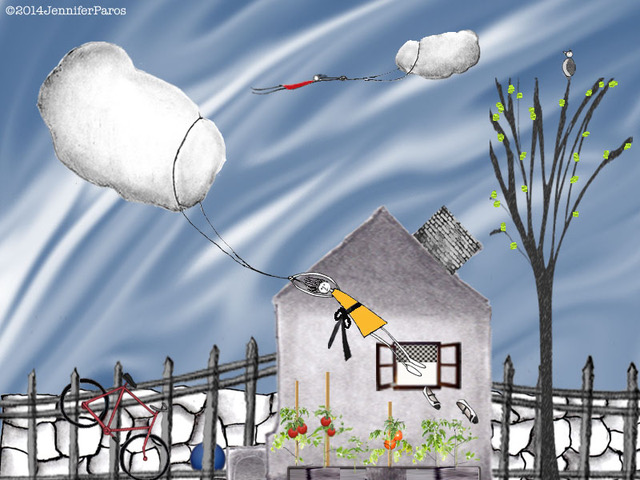The Drifter: Seven Billion Secrets to Success
by Jennifer Paros
June 2014
I drift, wait, and obey.
~ Harold Arlen, composer for The Wizard of Oz (on his creative process)
Lately, I’ve been feeling drifty. I have projects waiting for me. And I do think they’re waiting. These aren’t just passing fancies; these ideas stick around no matter how I neglect them, in full anticipation of all that they will become. I even have a novel—a couple finished drafts of it—I still want to complete. I have two other stories in progress. They’re like conversations I left mid-sentence. It’s as though I said, “Excuse me, I have to go to the bathroom” and have yet to return.
This phenomenon reminds me of the time in third grade when I avoided gym class because our teacher, Mr. Cruise (kind but firm), wanted me in the game. My wobbly ego wasn’t sure she wanted to be in the game—not in sports or in life. At eight, the jury was still out. So I let my body, mind, and spirit drift away from the game and into the bathroom, repeatedly. Like drifting from writing, it wasn’t a very conscious choice. I don’t remember ever literally choosing to hide in the bathroom; I just found myself walking away from the gym, as though carried by spirits who understood my position perfectly.
I’ve always perceived that time as a failure because I didn’t do what I was supposed to and felt afraid. But now I am reconsidering that ruling. Doing things because we’re supposed to is not inherently a strength. It could be that drifting has a purpose; it might allow us to leave what we think we’re supposed to do, think, or feel behind and clear the way for us to discover what we want to do, think, or feel and why.
When I’m actually at my desk working, I find drifting on a smaller scale a critical part of the creative process; it is the time when I unleash my mind from the usual. Drifting is necessary for discovery; it enables the full flow of imagination. And perhaps during the times of larger scale Life Drifting, something similar applies: the spirit goes off to re-find itself, to envision a new game, and to remember its reason for playing. Nobody else’s reason will do; it must be our own—one founded in freedom and joy.
I learned that you should feel free while writing, not like Lord Byron on the mountain top, but like a child stringing beads in kindergarten—happy, absorbed, and quietly putting one bead on after another.
~ Brenda Ueland
For several years when I was a kid I would occasionally get out a brown grocery bag, my crayons or markers, and write the alphabet followed by the numbers 1 through 100, all over the bag. The activity was satisfying; it was great having no questions about my capability or what to do next. And because I didn’t have any judgment on results, I was free to have a sense of clean accomplishment. It was nearly impossible to aggrandize or diminish the brown bag thing. It fit into no known category: not Art, Science, Mathematics, or Literature. Even “Handwriting Practice” didn’t accurately describe it. This freedom from categorization and external purposefulness was at the heart of why I liked the activity. It met no expectation, demand, or requirement. There was nothing about it I was supposed to do but something about it I just wanted to do.
In essence, writing isn’t a profound pursuit, lofty achievement, or source of identity. It’s a way for us to express ourselves. It’s a means, not a master. When we start feeling bossed by what we’re doing, then we might wander—only because we’ve forgotten why we’re doing it. We may have forgotten the simplicity and pleasure of doing something just to do it. A sense of joy and connection serves as our compass in all things unless we temporarily lose sight of this inner guide. We drift in order to move away from external motivation back to internal inspiration.
We can find our own way, and in order to be happy, we must. There are seven billion secrets to success in this world. Each of us is the blueprint for our own success, our own win. So if we drift for a while, no harm is done; we can never drift away from who we really are. Our true game waits; it waits for us to remember why we’re playing. And when we do, it becomes a lot easier to stay in the game.
Jennifer Paros is a writer, illustrator, and author of Violet Bing and the Grand House (Viking, 2007). She lives in Seattle. Please visit her website at www.jenniferparos.com.

